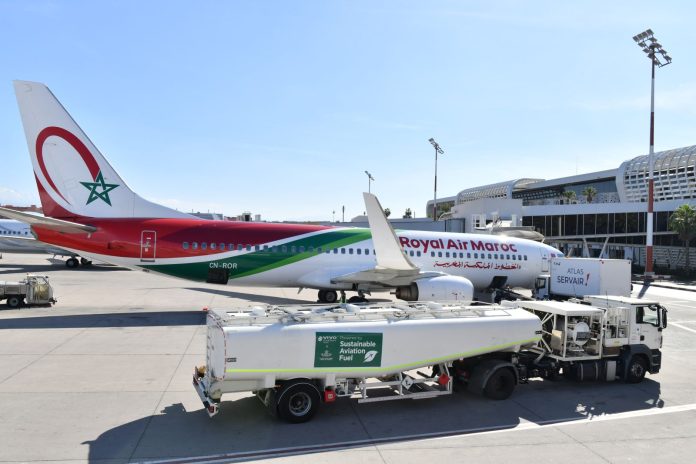Morocco’s aviation sector has taken a major step forward in its energy transition. On February 20, 2025, Royal Air Maroc (RAM) and Vivo Energy Maroc successfully operated the first Morocco-Europe flight powered by Sustainable Aviation Fuel (SAF). Flight AT740, a Boeing 737 NG traveling from Marrakech to Paris-Orly, marks a milestone for African aviation, aligning with the latest environmental regulations in the industry.
This initiative positions Morocco at the forefront of alternative fuel adoption in Africa, as the European Union now requires a minimum of 2% SAF for refueling operations within Europe.
Using SAF for this flight resulted in a one-third reduction in CO₂ emissions, cutting 10 tons of carbon output. The fuel, derived from renewable sources such as biomass and used oils, can reduce emissions by up to 80% over its lifecycle compared to traditional jet fuel. Another key advantage is its compatibility with existing aircraft engines, allowing airlines to adopt SAF without the need for costly modifications.

This breakthrough comes as Morocco strengthens its position as a leading aviation hub in Africa. With a booming tourism sector and modernized air transport infrastructure, the country is accelerating its efforts to decarbonize air travel.
Vivo Energy Maroc, a key fuel supplier, continues to invest in renewable energy and sustainable mobility solutions, reinforcing its role in Morocco’s green transition.
Royal Air Maroc, for its part, is advancing its environmental commitments by installing solar panels on its facilities, optimizing energy consumption, and improving waste management. These initiatives have earned the airline the Corporate Social Responsibility (CSR) label from Morocco’s Confédération Générale des Entreprises du Maroc (CGEM).
Towards widespread adoption of sustainable aviation fuel?
While this flight represents a symbolic step forward, large-scale SAF adoption remains challenging due to its high cost and limited production capacity. However, initiatives like this pave the way for gradual implementation, depending on technological advancements and regulatory incentives.
With this pioneering Marrakech-Paris flight, Morocco is sending a strong message: the country is ready to play a key role in the aviation sector’s energy transition, not only to meet international standards but also to position Africa as a major player in sustainable air travel.





